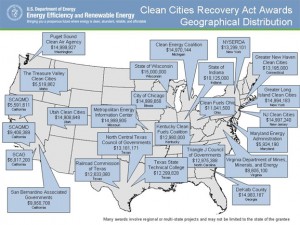 Nearly $300 million in American Recovery and Reinvestment Act… aka the “Stimulus Bill”… funds are being handed out by the U.S. Department of Energy to replace or change more than 9,000 vehicles so they will burn alternative fuels and/or make them more fuel efficient, as well as establish nearly 550 alternative refueling stations across the U.S..
Nearly $300 million in American Recovery and Reinvestment Act… aka the “Stimulus Bill”… funds are being handed out by the U.S. Department of Energy to replace or change more than 9,000 vehicles so they will burn alternative fuels and/or make them more fuel efficient, as well as establish nearly 550 alternative refueling stations across the U.S..
Energy Secretary Steven Chu made the announcement today about the selection of 25 cost-share projects under the Clean Cities program:
“The Clean Cities program is helping give state and local governments the tools they need to build a greener transportation system that will create new jobs and help to put America on the path to a clean energy future,” said Secretary Chu. “Advancing the number of alternative fuel and advanced technology vehicles on the road will increase our energy security, decrease our dependence on oil, and reduce pollution across the country.”
Under the Recovery Act, the Clean Cities program will fund a range of energy efficient and advanced vehicle technologies, such as hybrids, electric vehicles, plug-in electric hybrids, hydraulic hybrids and compressed natural gas vehicles, helping reduce petroleum consumption across the U.S. In addition, funding will support refueling infrastructure for various alternative fuel vehicles, including biofuels and natural gas. Other efforts under the Clean Cities program include public education and training initiatives to further the program’s goal of reducing the national demand for petroleum.
The projects announced by Secretary Chu will support a combined total of more than 9,000 light, medium and heavy-duty vehicles and establish 542 refueling locations across the country. The vehicles and infrastructure being funded include the use of natural and renewable gas, propane, ethanol, biodiesel, electricity, and hybrid technologies. And with the cost share contributions from the recipients, every federal dollar spent will be matched by nearly two dollars from the project partners.
The move is expected to save 38 million gallons of petroleum per year.

